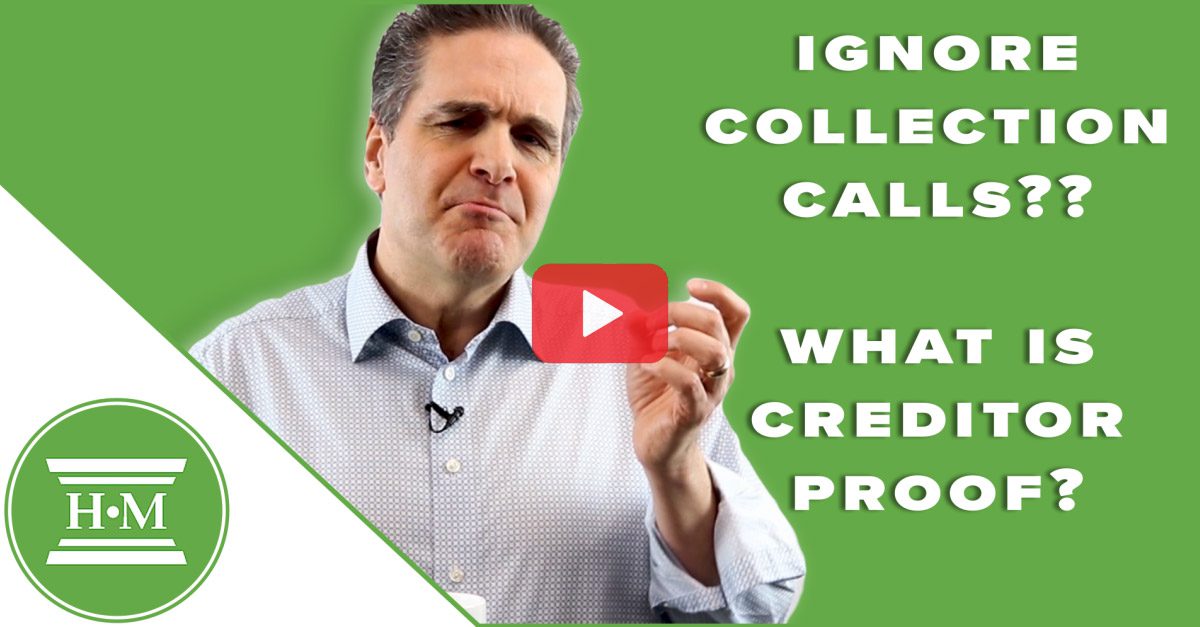
It’s not always easy or feasible to keep up with paying your bills. Living paycheque to paycheque combined with rising expenses or a loss of income can drain your budget and lead to missed debt payments. If you stop making payments for too long, you can expect to receive calls from debt collectors.
Can you safely ignore collection calls? Do debt collectors give up? If not, how can you stop the collection calls for good?
Table of Contents
What Happens if You Don’t Answer Collection Calls?

Ignoring debt collector calls for unpaid debts can have several consequences, including:
The phone calls won’t stop: Debt collectors have the legal right to pursue debts on behalf of lenders, and ignoring the calls doesn’t make the debt go away. If you owe money, the debt collector will continue to contact you to the extent permitted by law. In Canada, federal and provincial legislation sets clear boundaries for how collectors can communicate with you, including restrictions on harassment, times of day they can call, disclosure, and misrepresentation.
Negative impact on your credit score: Overdue debts are often assigned or sold to a collection agency. You account information will show as “In Collections” when this happens. In Canada, collections will remain on your credit bureau report for six years. This type of notice will hurt your credit score. A score below 560 is generally considered poor. Negative marks on your credit report make it difficult to secure loans or credit cards except at very high interest rates. A low credit score can also impact your ability to rent housing. Some employers may even check credit history as part of their hiring process.
Legal action: A debt collection agency in Canada can call you to collect forever, but they have a limited time to sue. Ontario’s statute of limitations law states that creditors must initiate legal action within two years. A recent court case also ruled that creditors cannot file a claim in bankruptcy for old debt. The result is that many debt collectors are proceeding sooner with collection lawsuits to avoid having their debt be statute-barred due to the limitations period expiring.
Judgment order: If a debt collector sues you for an outstanding debt, they may get a judgment order, which is a confirmation from the court that you owe the money. In Canada, a judgment is reported in the public records section of your credit report and will remain for six years.
Wage garnishment: A debt collector can enforce a judgment order by asking the court for permission to take a portion of your paycheque until the debt is repaid. The collection agency will then issue a notice of garnishment to you and your employer. Your employer is legally obligated to enforce a wage garnishment order unless the debt is paid in full or the wage garnishment is stopped through a bankruptcy or consumer proposal.
Frozen bank accounts and seizure of property: Another consequence of ignoring debt collection calls is having your bank account frozen or your property seized. This process, called asset seizure, can significantly impact your financial stability. Debt collectors can continue to seize funds deposited in your bank account until the debt is paid in full or until you file insolvency.
The right of offset: Most banks and financial institutions have debt collection clauses in their account agreements that allow them to take money from your savings or chequing account without a court order to offset a debt owed to the same bank. This right of offset can mean an unexpected withdrawal from your bank account and may even lead to insufficient funds, often resulting in additional NSF fees.
Contacting friends and family: If debt collectors cannot reach you, they may legally contact your friends, family members, or employer to obtain your contact information. They cannot request that they pay off your debt unless the person they are contacting has co-signed a loan with you.
Can Debt Collectors Sue You?
The short answer is that a collection agency can sue, but the likelihood that they will is very low.
There are four reasons why a debt collector would not pursue legal action to collect:
-
The debt is too old. Debt collectors must sue within the limitations period, which varies by province in Canada but generally ranges from two to six years. The limitations period starts from the last payment date on your account.
-
The debt is too small. Collection agencies are usually unwilling to incur legal and court costs to pursue small debts.
-
You are creditor-proof. If you don’t possess any assets or income that can be garnished, there is no reason to ask the court to help with collection.
-
You reside outside of Canada and have no assets here.
So, how long can debt collectors try to collect in Canada? While they must sue within the limitation period, it is essential to remember that regardless of the size or type of debt, collection agencies have the legal right to continue to call you indefinitely.
Tired of creditor calls?
Don’t Ignore Canada Revenue Agency Collections
The Canada Revenue Agency (CRA) has strong collection powers and is not generally subject to other federal or provincial collection laws. The CRA collects tax debts, including income tax, HST or GST, and overdue student loan debt.
CRA can freeze your bank account, garnish your wages, and seize assets without a court order. Therefore, it is not a good idea to ignore collection calls from the Canada Revenue Agency.
If you are behind on tax payments, you must either work out a payment plan with the Canada Revenue Agency or file an insolvency proceeding, like a consumer proposal, with a Licensed Insolvency Trustee.
When Not to Pay Debt Collectors
While simply ignoring collection calls may not be a good idea, there are times when you should never pay a collection agency.
If you feel you don’t owe the debt or the debt is not yours, explain this to the debt collector. If you’ve already paid the debt, send them proof – perhaps a bank statement or paid invoice notice.
If your debt is statute-barred and past the limitation period, don’t make a payment unless you intend to pay off the debt. Even a partial payment can reset the clock.
If you can’t afford to repay the debt, or the debt collector won’t accept a debt settlement offer from you for less than the total amount, don’t make any payments before talking with a Licensed Insolvency Trustee about debt relief options that can stop collection actions and eliminate the debt.
Stop Collection Calls for Good
Debt collectors have one job: to collect money you owe on that credit card, line of credit, bank loan, payday loan or overdue bill payment. While no law says you must respond to a debt collector, the constant phone calls can be stressful. They will continue to call until the debt is paid or settled or until they are forced to stop through other legal means.
If you are experiencing collection calls, several debt relief options can help you deal with the underlying debt problem.
Credit counselling is suitable for small, unsecured debts, including credit cards, personal loans, lines of credit and outstanding bill payments. A credit counsellor can help you create a budget, negotiate with creditors, and potentially set up a debt management plan (DMP) to repay the debt. A DMP will not deal with money owed to the Canada Revenue Agency, and not all creditors will agree to participate in this voluntary repayment program. Contact a non-profit credit counselling agency if you can afford to repay your debt in full but need a more formal structured program.
Debt consolidation can help you roll multiple high-interest debts, especially credit card debts, into one low-interest loan. It is suitable for those with a reasonably good credit rating. If you have several accounts in collection, you may not qualify for a debt consolidation loan through a bank or credit union. Online lenders may be able to help, but the interest rate may be too high to be affordable.
The only legal way to stop collection actions in Canada, short of paying, is to file a bankruptcy or consumer proposal. Credit counselling cannot legally stop collection calls unless the debt collector agrees to participate. It is also unlikely that you will qualify for a debt consolidation loan if you have accounts on your credit report that are in collection.
A consumer proposal is a formal agreement made through a Licensed Insolvency Trustee that allows you to offer partial repayment of your debts to creditors. It offers a stay of proceedings that legally stops collection actions, such as garnishing wages or legal proceedings. A consumer proposal can settle credit card debt, bank loans, payday loans, and tax debts for as little as 20 cents on the dollar, although your repayment plan will depend on your income and assets. Your Licensed Insolvency Trustee will work with you to develop a plan you can afford.
If you can’t afford a settlement arrangement through a consumer proposal, you may need to file bankruptcy to stop the phone calls and discharge your unsecured debts.
If your debt is substantial and cannot be ignored, contact us for a free consultation. We can help you become debt-free and stop the collection calls for good.
How to Handle Collection Calls Responsibly
Now that you know the repercussions and potential consequences of ignoring debt collection calls, let’s take a minute to learn how we can adequately respond to debt collectors.
-
Although you may be nervous or anxious when speaking with an agent, try your best to remain calm.
-
Ask for the collector’s name, the company they represent, details about the debt they collect, and their phone number.
-
Have a plan of what you want to say. If you agree to pay in full, have a repayment plan ready. If you decide to negotiate a settlement with the collection agency, decide what lump sum or monthly payment you can afford. Start any settlement offer low, even as low as 5 cents on the dollar, if it’s an old debt.
-
Be careful what you say to the collector as they track your interactions. Anything you say could be used against you if the debt is taken to court.
-
Never give the collector personal information. If they don’t have it in their records, don’t volunteer any additional information, such as where you work or banking information.
-
Be prepared to hang up if the debt collector becomes aggressive or harassing or the conversation does not go as you plan.
-
Don’t make a good faith deposit or promise to pay unless you intend to pay off the debt. Doing so will validate the debt and reset the limitation period.
-
Take notes or record the conversation. If you agree to a payment arrangement, ask for confirmation in writing or by email. Ensure the details are correct before making any payment.
-
Never make an offer that you cannot afford.
Know your rights when it comes to dealing with a collection agency. If you think the debt collector has broken the law or has used threatening or abusive language, report them to your province’s consumer affairs office.





